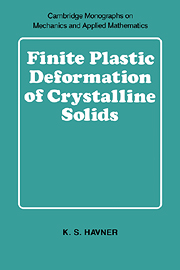Book contents
- Frontmatter
- Contents
- Preface
- 1 An Historical Introduction
- 2 The Kinematics of Double Slip
- 3 A General Theory of Elastoplastic Crystals
- 4 Axial-Load Experiments and Latent Hardening in Single Crystals
- 5 Analysis of Crystals in Channel Die Compression
- 6 Theoretical Connections between Crystal and Aggregate Behavior
- 7 Approximate Polycrystal Models
- Appendix: The General Theory of Work-Conjugate Stress and Strain
- References
- Index
1 - An Historical Introduction
Published online by Cambridge University Press: 11 September 2009
- Frontmatter
- Contents
- Preface
- 1 An Historical Introduction
- 2 The Kinematics of Double Slip
- 3 A General Theory of Elastoplastic Crystals
- 4 Axial-Load Experiments and Latent Hardening in Single Crystals
- 5 Analysis of Crystals in Channel Die Compression
- 6 Theoretical Connections between Crystal and Aggregate Behavior
- 7 Approximate Polycrystal Models
- Appendix: The General Theory of Work-Conjugate Stress and Strain
- References
- Index
Summary
The scientific study of finite distortion of cubic metal crystals was formally inaugurated by G. I. Taylor's 1923 Bakerian Lecture to the Royal Society (Taylor & Elam 1923), and the development of a rational mechanics of finite plastic deformation of crystalline solids may be said to have begun. The remarkable feature of this pioneering work (and of all Taylor's subsequent experimental investigations of f.c.c. and b.c.c. crystals) is that, in addition to the use of X-ray analysis to determine the changing orientation of the crystal atomic lattice, external measurements sufficient to completely define the uniform distortion of the crystal specimen were made at each stage of the test. All material directions that remained unchanged in length were then established by exact geometric analysis.
Taylor's approach is to be distinguished from that of Mark, Polanyi & Schmid (1923), whose experimental study of crystals of hexagonal structure is of comparable historical importance. They pulled single crystal wires of zinc and assumed that slip lines (or bands) on the specimen surface were traces of a family of planes of single slip, which were then shown to coincide with a crystal plane. Taylor (1926), discussing such methods in general, rather amusingly remarked: “They depend in fact on knowing the form which the answer will take before starting to solve the problem.”
Taylor & Elam (1923) firmly established two experimental laws of fundamental and lasting value for the foundations of crystal mechanics that seven decades of experimentation on f.c.c. crystals have only served to reinforce.
- Type
- Chapter
- Information
- Finite Plastic Deformation of Crystalline Solids , pp. 1 - 17Publisher: Cambridge University PressPrint publication year: 1992

